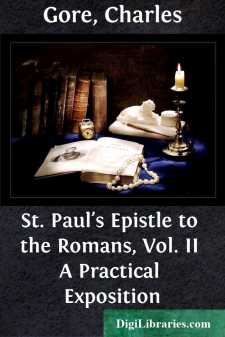Categories
- Antiques & Collectibles 13
- Architecture 36
- Art 48
- Bibles 22
- Biography & Autobiography 813
- Body, Mind & Spirit 142
- Business & Economics 28
- Children's Books 15
- Children's Fiction 12
- Computers 4
- Cooking 94
- Crafts & Hobbies 4
- Drama 346
- Education 46
- Family & Relationships 57
- Fiction 11828
- Games 19
- Gardening 17
- Health & Fitness 34
- History 1377
- House & Home 1
- Humor 147
- Juvenile Fiction 1873
- Juvenile Nonfiction 202
- Language Arts & Disciplines 88
- Law 16
- Literary Collections 686
- Literary Criticism 179
- Mathematics 13
- Medical 41
- Music 40
- Nature 179
- Non-Classifiable 1768
- Performing Arts 7
- Periodicals 1453
- Philosophy 64
- Photography 2
- Poetry 896
- Political Science 203
- Psychology 42
- Reference 154
- Religion 513
- Science 126
- Self-Help 84
- Social Science 81
- Sports & Recreation 34
- Study Aids 3
- Technology & Engineering 59
- Transportation 23
- Travel 463
- True Crime 29
St. Paul's Epistle to the Romans, Vol. I A Practical Exposition
by: Charles Gore
Description:
Excerpt
Introduction.
i.
St. Paul's great Epistle to the Romans was written, as may be quite confidently asserted, from Corinth, during the second visit to Greece recorded in the Acts[], i.e. in the beginning of the year commonly reckoned 58, but perhaps more correctly 56 A.D.—the year following the writing of the Epistles to the Corinthians. The reasons for this confident statement, and indeed for all that needs to be said about the circumstances under which St. Paul wrote and the conditions of Christianity at Rome, become apparent chiefly in connexion with the later parts of the epistle which are not included in this volume. They shall therefore be omitted here, and we will content ourselves for the moment with a very brief statement of the results in which scholars are now finding, as it would seem, final agreement.
The existence of Christians at Rome was due not to any apostolic founding, for no apostle appears yet to have visited Rome, but to the sort of 'quiet and fortuitous filtration[]' of Christians from various parts of the empire to its great centre which must naturally have taken place; for from all quarters there was a tendency to Rome. 'Some from Palestine, some from Corinth, some from Ephesus and other parts of Proconsular Asia, possibly some from Tarsus, and more from the Syrian Antioch, there was in the first instance, as we may believe, nothing concerted in their going; but when once they arrived in the metropolis, the freemasonry common among Christians would soon make them known to each other, and they would form, not exactly an organized Church'—that may well have been the result of the later presence of St. Paul and St. Peter—'but such a fortuitous assemblage of Christians as was only waiting for the advent of an apostle to constitute one[].' Among this assemblage of Christians it appears evident from St. Paul's language[] that there must have been Jews as well as Gentiles; but the dominant character of the church was Gentile[]. It is perhaps only putting this in another way to say that there would have been among the Roman Christians elements of hostility to St. Paul and his teaching, but Christianity as St. Paul taught it would have been in the ascendant. And probably St. Paul's special informants about affairs there would have been his special friends, Prisca and Aquila[].
The character of the epistle written to these Christians of the capital is marked. It has beyond any other of St. Paul's epistles the character of an ordered theological treatise. Of course it assumes the existence of accepted Christian principles—the rudimentary instruction or Christian 'tradition'—in the minds of those to whom it was addressed[]. But it takes certain of these principles of the Christian religion and develops them systematically and argumentatively; though again, it must be explained, the argument is very far from being barely logical, but is full of the deepest feeling, showing itself in passages of memorable eloquence which live in the hearts of all of us.
Why this particular epistle should have this character of a systematic treatise is not hard to see....













